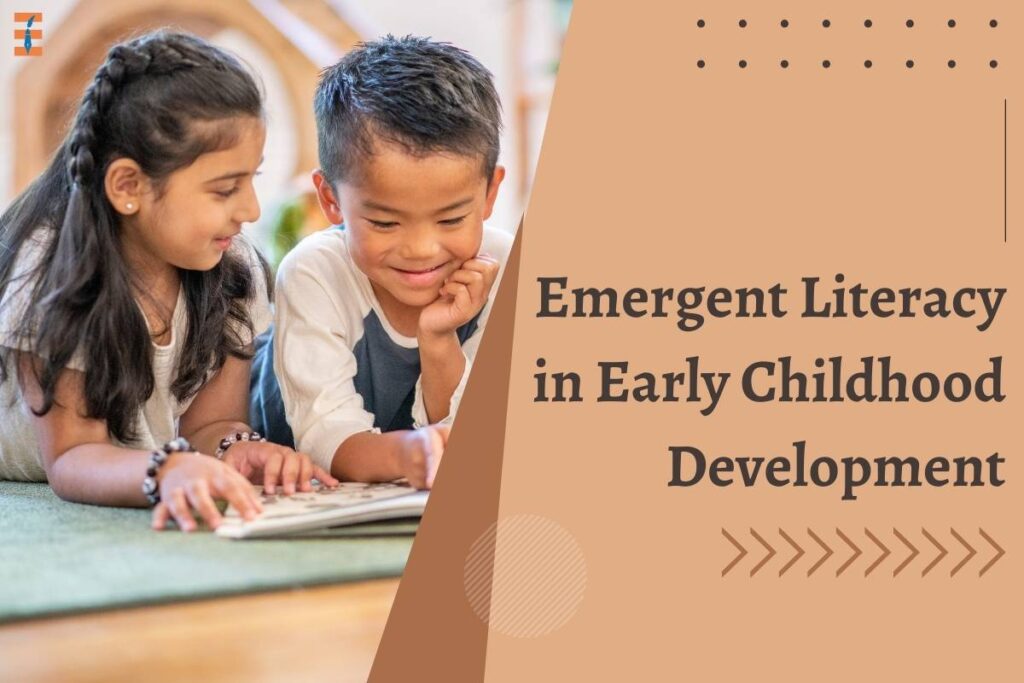In the early years of a child’s life, a crucial foundation is laid for future academic success and overall well-being. At the heart of this foundational stage is emergent literacy, a term that encompasses the skills and experiences that set the stage for reading and writing. This article explores the concept of emergent literacy, delving into what it is and why it holds paramount importance in the holistic development of young minds.
Defining Emergent Literacy :
Emergent literacy refers to the early, foundational skills and behaviors that precede and predict conventional reading and writing. It encompasses a range of experiences, from exposure to books and prints to understanding the mechanics of language. It is not about formal instruction but rather the natural development of skills that create a strong basis for later literacy learning.
1. Components of Emergent Literacy:
- Oral Language Development: The ability to understand and use language through listening and speaking is fundamental to emergent literacy.
- Phonological Awareness: Recognizing and manipulating the sounds of spoken language lays the groundwork for understanding the relationship between letters and sounds.
- Print Awareness: Understanding that print carries meaning, recognizing letters, and grasping the concept of words on a page are critical components.
- Alphabet Knowledge: Becoming familiar with the alphabet is a precursor to learning how letters represent sounds and form words.
2. The Role of Early Experiences:
A child’s early experiences shape their emergent literacy skills. The home environment, interactions with caregivers, and exposure to diverse language experiences all play a pivotal role in laying the groundwork for literacy development.

- The Importance of Reading Aloud: Reading to young children exposes them to rich vocabulary, narrative structures, and the joy of storytelling. This fosters a positive attitude toward reading and establishes a connection between spoken and written words.
- Encouraging Conversations: Engaging in conversations with children helps develop their oral language skills. Discussions, questions, and shared experiences enhance vocabulary, comprehension, and the ability to express thoughts.
- Print-Rich Environment: Surrounding children with a print-rich environment, including labeled objects, books, and writing materials, encourages print awareness and an early understanding of the purpose of written language.
- Phonemic Play: Activities that involve rhyming, clapping syllables, and recognizing initial sounds in words contribute to the development of phonological awareness.
3. The Connection to Later Literacy Success:
Emergent literacy serves as a strong predictor of later literacy success. Children who develop solid emergent literacy skills are better equipped to navigate the challenges of formal reading and writing instruction when they enter school.

- Enhanced Phonemic Awareness: Children with a strong foundation in emergent literacy tend to exhibit advanced phonemic awareness, making it easier for them to grasp the relationship between sounds and letters.
- Improved Reading Comprehension: Early exposure to diverse language and storytelling lays the groundwork for improved reading comprehension later on. Understanding narrative structures and contextual cues becomes more natural for children with strong emergent literacy skills.
- Positive Attitude Toward Learning: Children who have positive early literacy experiences are more likely to approach formal education with enthusiasm. A positive attitude toward learning is a powerful predictor of academic success.
4. Supporting Emergent Literacy Development:
Parents, caregivers, and educators play pivotal roles in supporting literacy development. Creating an environment that fosters language-rich experiences and providing intentional opportunities for exploration can significantly impact a child’s literacy journey.
- Promoting a Love for Books: Reading aloud regularly, visiting the library, and allowing children to choose books of interest contribute to a love for reading. Positive associations with books create a strong foundation for literacy engagement.
- Engaging in Meaningful Conversations: Encourage open-ended conversations, ask questions, and actively listen to children. Meaningful interactions contribute to vocabulary development, comprehension skills, and the ability to express thoughts coherently.
- Hands-On Phonemic Awareness Activities: Incorporate playful activities that involve rhyming, clapping syllables, and identifying initial sounds. These activities make phonemic awareness development enjoyable and engaging.
- Creating Print-Rich Environments: Labeling objects, incorporating words into daily routines, and providing access to writing materials create an environment where print is an integral part of a child’s world.
- Interactive Storytelling: Encourage children to engage in storytelling. This can involve retelling familiar stories, creating their narratives, or even illustrating their stories. Interactive storytelling enhances language skills and creativity.
5. Emergent Literacy in Diverse Settings:
It’s essential to recognize that emergent literacy development occurs in diverse settings, including homes, communities, and early childhood education settings. Collaboration between parents, caregivers, and educators ensures a holistic approach to supporting children’s literacy skills.

- Inclusive Educational Practices: Early childhood education programs should incorporate inclusive practices that cater to diverse learning styles and backgrounds. This ensures that all children have access to rich language experiences.
- Community Involvement: Engaging communities in literacy initiatives fosters a collective responsibility for children’s early literacy development. Libraries, community centers, and local initiatives play crucial roles in supporting it.
Conclusion
Emergent literacy is the cornerstone of a child’s literacy journey, providing the scaffolding for future reading and writing proficiency. Understanding the components of emergent literacy, the role of early experiences, and its connection to later literacy success empowers parents, caregivers, and educators to foster a nurturing environment for children’s literacy development. By embracing the principles of emergent literacy and incorporating intentional practices into various settings, we pave the way for a future generation of confident, capable, and enthusiastic readers and writers.
Also Read: Understanding the Importance of Least Restrictive Environment (LRE) in Early Childhood










